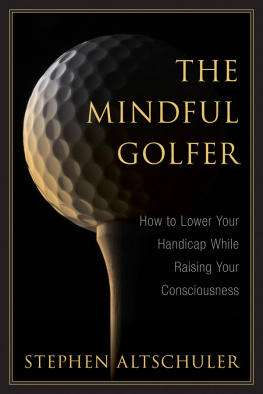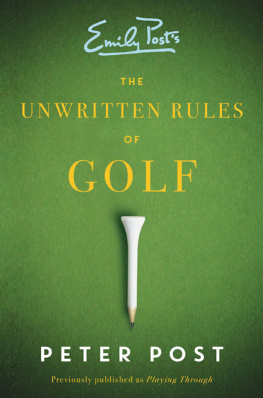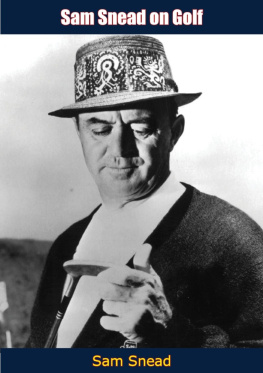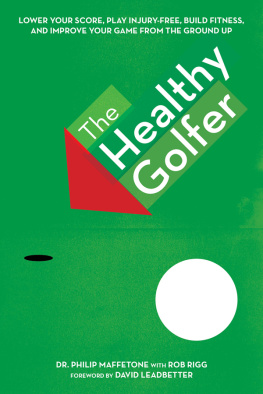Dedication:
To Golfers Everywhere: Learn. Have fun. Stay with it.
Copyright 2015 by Stephen Altschuler
All rights reserved. No part of this book may be reproduced in any manner without the express written consent of the publisher, except in the case of brief excerpts in critical reviews or articles. All inquiries should be addressed to Skyhorse Publishing, 307 West 36th Street, 11th Floor, New York, NY 10018.
Skyhorse Publishing books may be purchased in bulk at special discounts for sales promotion, corporate gifts, fund-raising, or educational purposes. Special editions can also be created to specifications. For details, contact the Special Sales Department, Skyhorse Publishing, 307 West 36th Street, 11th Floor, New York, NY 10018 or .
Skyhorse and Skyhorse Publishing are registered trademarks of Skyhorse Publishing, Inc., a Delaware corporation.
Visit our website at www.skyhorsepublishing.com.
10 9 8 7 6 5 4 3 2 1
Library of Congress Cataloging-in-Publication Data is available on file.
Cover design by Jane Sheppard
Cover photo credit Dollar Photo Club
Interior photos by the author
ISBN: 978-1-63220-723-4
Ebook ISBN 978-1-63220-998-6
Printed in China
Contents

The Starters Hut
A T THE TIME of the Buddha, golf had not yet been invented, but what the great sage discovered when he achieved his enlightenmentnamely, The Four Noble Truthscan be directly applied to golf, making the game a vehicle to higher consciousness. The first is that all human beings suffer, a truth felt all too often during any given round of the great game. The second truth is that suffering occurs as a result of desire, and dont all golfers desire to get better? The third Noble Truth is that there is a way out of suffering and that way is a cessation of desire, and dont all of us golfers want to know that way out of suffering, especially in relation to slices, shanks, and finding all sorts of hazards? And finally, the Fourth Noble Truth addresses a way leading to the cessation of suffering via the Noble Eightfold Path, namely, right view, right intention, right speech, right action, right livelihood, right effort, right mindfulness, and right concentration. Applied to golf, thats a lot of rights for a game where a lot of wrongs can come into play.
Introduction
There is an old Taoist folktale that gets at the heart as to why golf, while being arguably the hardest of games, also offers the deepest life lessons. As heard from the Buddhist teacher and author Jack Kornfield, it goes like this:
A man named Sei Weng owned a beautiful mare, which was praised far and wide. One day this beautiful horse disappeared. The people of his village offered sympathy and sorrow to Sei Weng for his great misfortune.
Sei Weng said simply, Maybe.
A few days later the lost mare returned, followed by a beautiful wild stallion. The village congratulated Sei Weng for his good fortune.
He said, Maybe.
Some time later, Sei Wengs only son, while riding the stallion, fell off and broke his leg. The village people once again expressed their sympathy at Sei Wengs misfortune.
Sei Weng again said, Maybe.
Soon thereafter, war broke out, and all the young men of the village except Sei Wengs lame son were drafted and were killed in battle. The village people were amazed at Sei Wengs good luck. His son was the only young man left alive in the village.
But Sei Weng kept his same attitude: despite all the turmoil, gains and losses, he gave the same dispassionate reply, Maybe.
My own twenty-first-century version of the story has to do with the nasty cold I caught, skirting the edge of flu season. Oh, thats terrible, my friends bemoaned.
Maybe, I said.
Three days later Id made significant progress on this book, having taken sick days from my full-time job. Oh, how terrible that you lost so much time at work and you couldnt go to the gym after work like you always do.
Maybe, said I.
Turns out, I lost the five pounds I couldnt lose at the gym, because a fever and inactive taste buds made food uninteresting. This play of opposites will go on, Im sure, like losing yardage off the tee as a result of the weight loss. Oh, how awful, my golf friends will say.
Maybe, I reply, now safe in the fairway at the 150-yard marker every time.
Golf constantly confronts the player with fortune and misfortune, and the effect each one plays on the mind. Attach to either one, and youre in big trouble. As a result, the game tests you physically, mentally, emotionally, and spiritually. It can lift your spirits like nothing else; or it can send you into the hell realms. It seems silly to non-participants, the brunt of jokes by comedians, and clownish to others, something most U.S. presidents seem to play at great risk of appearing both elitist and klutzy, and a total mystery to most non-golfers who witness their friends and spouses in various states of elation or depression when they return from a day at the course. Even the greatest players are buffeted by this sometime cruel interplay of fortune and misfortune. Amateurs can be absolutely inundated and consumed by that interplay.
In my experience, in over fifty years as a player, about thirty as a meditation practitioner, and forty as a mental health counselor, golf is a game that brings suffering or elation to the surface as no other sport can. It looks innocuous enough, but in a five-hour round, emotions suited to a funeral, a wedding, or serious road rage incidents come into playparticularly the road rage. It brings emotions to the surface faster than any human interaction, calling for an immediate responsea response that somehow needs to clear the slate to allow the golfer to be ready for the next shot, which follows quickly since there are others behind you waiting to play.
In Buddhist terms it requires a complete action and a letting goboth a total involvement and a non-attachment to results. It requires an absorption in the moment, for if memory of the preceding moment intervenes, that will surely muck up the concentration needed to perform the next shot.
It is not unlike the Buddha, seeking freedom from the hindrances of his own mind, sitting under a fig tree fighting off those hindrances, manifested by the goddess Mara, one after the next. And golf has a whole litany of hindrances to contend with, the mind itself being the most contentious. Golf is an outdoors game, subject to the many vicissitudes of climate and weather.
Many of a golf courses defensesyes, course designers think of it that waylike sand traps and water hazards, are planned with making it hard on the golfer. Many of its defenses are unpredictable like wind and rain. And many play on the mind, triggering reactions that get you to do things you really shouldnt have donelike hit a 4-iron 200 yards over a lake to a small green. OK for professionals, but no, most amateurs wouldnt want to go there.
However, many a weekend golfer would look at that shot, think of what his buddies might think if he played short of the lake, and pull out that club with a prayer attached. He knows he shouldnt attempt it, but his ego shifts into higher gear, challenging his sensibilities, and linking the shot with his identity as a man (women golfers dont usually have these problems).
In other words, golf mimics life like no other sport. It blends elements of the emotional, physical, mental, and spiritual, bringing moments of elation as well as despair. Golf takes courage, faith, skill, patience, restraint, and passion to play it well and continue playing it throughout a lifetime. And you can play golf at almost any age.












